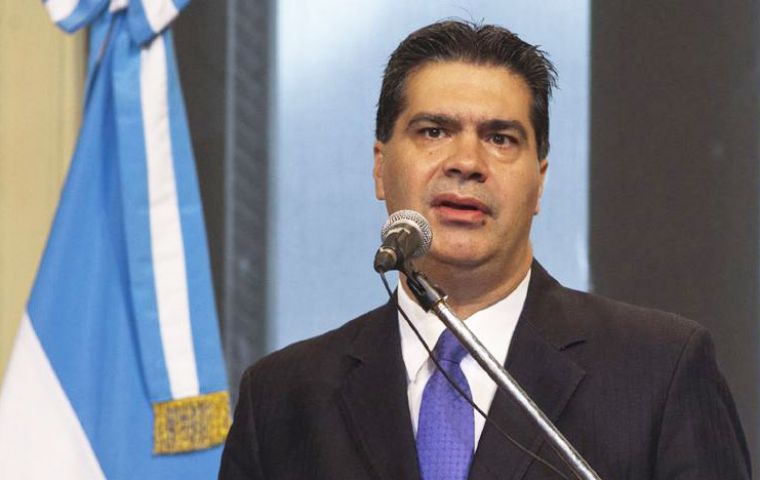MercoPress. South Atlantic News Agency
Argentina tells bondholders to take legal action against Judge Griesa who is 'withholding funds'
 “Instead of demanding the acceleration, bondholders should take legal actions against Griesa who is improperly withholding funds” said Capitanich
“Instead of demanding the acceleration, bondholders should take legal actions against Griesa who is improperly withholding funds” said Capitanich  Owl Creek said accelerating par bonds, trading at 54 cents on the dollar, could provide investors with a gross return of 100% in a subsequent restructuring.
Owl Creek said accelerating par bonds, trading at 54 cents on the dollar, could provide investors with a gross return of 100% in a subsequent restructuring. Argentine Cabinet chief Jorge Capitanich called bondholders to “take legal action against (US Judge Thomas) Griesa instead of demanding the acceleration of (Argentine) bonds,” following rumors that Owl Creek Asset Management LP is discussing the formation of a group to demand immediate repayment on bonds.
“Instead of demanding the acceleration, bondholders should take legal actions against (US Judge Thomas) Griesa who is improperly withholding funds,” the chief of ministers said in his daily press briefing at the government house.
Owl Creek said that it is working to demand the acceleration of Argentine debt as soon as January, which may provide investors with a gross return of 100% in a subsequent restructuring.
Capitanich reiterated the government claims that Argentina is honoring its debt commitments. “The one breaking the law is the judge himself, not Argentina,” he stressed and added that “ruling after ruling, judge Griesa reaffirms the situation of judicial limbo.”
Under the 'acceleration' clause the hedge fund would need to hold at least 25% of the 5.4 billion dollars of debt to accelerate after they officially fall into default on October 30, when a 30-day grace period expires.
Owl Creek said accelerating the so-called par bonds, which trade at about 54 cents on the dollar, may provide investors with a gross return of 100% in a subsequent restructuring.
Owl Creek added that this could take place as soon as January, when Argentina may negotiate with a separate group of 'holdout' investors who won a lawsuit to block payments on the nation’s overseas debt until bonds from its previous default in 2001 are paid in full.
The acceleration clause in a contract, especially a loan or bond, allowing a creditor to call the debt if certain, stated events occur. For example, if a borrower defaults on two or more payments, an acceleration clause may allow a lender to force the borrower to repay the entire amount of the loan immediately. Failure to repay could absolve the lender of all obligations in the contract, including the requirement to refund any money the borrower had previously paid, and render it effectively null and void.
The January mention refers to the so called RUFO clause or Rights Under Final Offer, which basically means that if Argentina “voluntarily” makes a better offer to some creditors before December 31st, 2014, other bondholders have a right to the same treatment. That is, those bondholders who accepted restructuring of the Argentine sovereign debt (30 cents to the dollar) would be entitled to full payment (100 cents plus interests).
Here is how the RUFO clause is written in the Argentine bond prospects:
”Under the terms of the Pars, Discount and Quasi-pars, if following the expiration of the Offer until December 31, 2014, and except as provided below, Argentina voluntarily makes an offer to purchase or exchange or solicits consents to amend any Eligible Securities not tendered or accepted pursuant to the Offer, Argentina has agreed that it will take all steps necessary, including making any required filings, so that each holder of Pars, Discounts or Quasi-pars will have the right, for a period of at least 30 days following the announcement of such offer, to exchange any of such holder’s Pars, Discounts or Quasi-pars for (as applicable).




Top Comments
Disclaimer & comment rules-

-

-

Read all commentsArgentine Cabinet chief Jorge Capitanich called bondholders to “take legal action against (US Judge Thomas) Griesa instead of demanding the acceleration of (Argentine) bonds.
Oct 30th, 2014 - 09:43 pm 0It's not just KFC who likes to humiliate herself on the world stage, Capitanich is at it now!!!!
LOLz!!!
Finally got voluntarily in quotes. RUFO claim is a red herring. lol!
Oct 30th, 2014 - 10:00 pm 0British Bomber's nana can finally eat something more than Pal for dinner.
Oct 30th, 2014 - 10:02 pm 0Commenting for this story is now closed.
If you have a Facebook account, become a fan and comment on our Facebook Page!